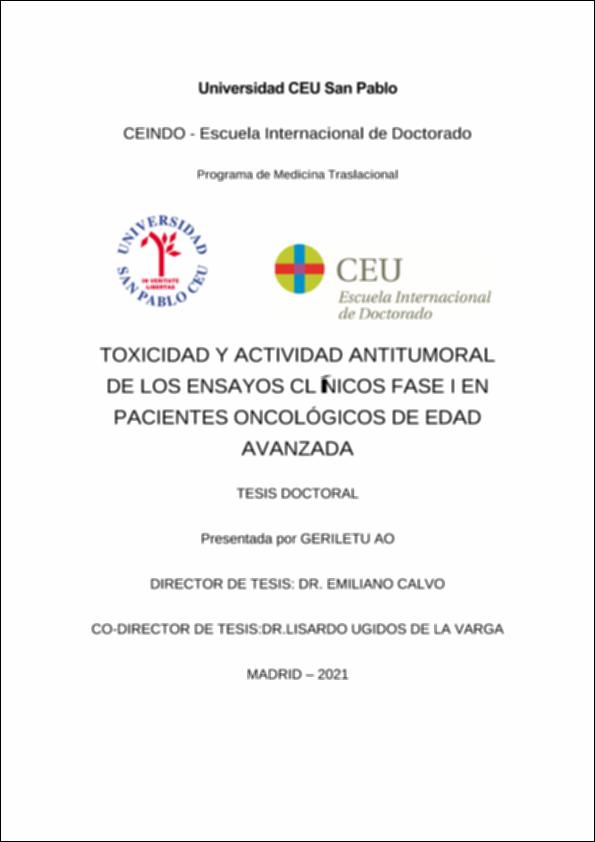Por favor, use este identificador para citar o enlazar este ítem:
http://hdl.handle.net/10637/13406Toxicidad y actividad antitumoral de los ensayos clínicos fase I en pacientes oncológicos de edad avanzada .
| Título : | Toxicidad y actividad antitumoral de los ensayos clínicos fase I en pacientes oncológicos de edad avanzada . |
| Autor : | Ao, Geriletu |
| Materias: | Ensayos clínicos de fase temprana; Actividad antitumoral; Early-phase clinical trials; Antitumor activity |
| Resumen : | Aunque actualmente el envejecimiento de la población y los casos de cáncer están en aumento, la población anciana sigue infrarrepresentada en los ensayos clínicos oncológicos. En parte, esto se debe probablemente a la falta de evidencia científica sobre la tolerabilidad y actividad tumoral de los nuevos fármacos en esta población. En este estudio, hemos recogido una serie de pacientes tratados en ensayos clínicos fase 1 con el objetivo de analizar la tolerancia y efectividad en los ancianos.
Para ello, se han recogido los datos de 773 pacientes incluidos de forma consecutiva en 85 ensayos clínicos fase 1 durante el periodo comprendido entre los años 2008-2016 en START Madrid-CIOCC y evaluados según la edad, en cuanto a la respuesta radiológica, supervivencia y tolerabilidad. Introduction: Although the population is aging and the number of cancer cases among the elderly continues to increase, this subset of patients is still underrepresented in clinical trials, in part because of unresolved uncertainties about tolerability and antitumor activity in this population. We reviewed our series to study tolerance and efficacy of novel phase1 agents in elderly patients. Methods: Seven hundred seventy-three consecutive evaluable patients in 85 phase 1 ﹤clinical trials between 2008 and 2016 in START Madrid-CIOCC were analyzed according to age with respect to objective response, survival, and toxicity. Results: The mean age was 58.7years (range: 18-87),260(33.6%) patients were>65y (elderly group). One hundred thirty-seven patients (17.8%) received immunotherapy drugs, 308(39.8%) targeted agents and 328(42.4%) chemotherapy. No statistically significant differences in overall survival, objective response, or severe toxicity rates were seen according to treatment type. Similar toxicity and clinical activity were observed in the two age subgroups:18.8% of elderly patients and 20.7% of non-elderly had severe hematological toxicity (p=0.5), whereas 30.2% and 32.7%, respectively, had severe non-hematological toxicity (p=0.4). Regarding antitumor activity, 12.4% of elderly patients and 15% of non-elderly patients achieved objective responses(p=0.41). Also, there were no significant differences in overall survival (9.7monthsvs.11.5 months, p=0.1) or progression-free survival (2.3monthsvs.2.2months, p=0.7). Conclusions: In this retrospective study, the elderly and non-elderly populations showed comparable antitumor activity and toxicity profiles, justifying the participation of the former in early-phase trials. |
| Descripción : | Tesis-CEINDO, Universidad San Pablo CEU, Programa en Medicina Traslacional, leida el 26 de enero de 2022 |
| Director(es): | Calvo Aller, Emiliano |
| URI : | http://hdl.handle.net/10637/13406 |
| Derechos: | http://creativecommons.org/licenses/by-nc-nd/4.0/deed.es |
| Fecha de publicación : | 23-feb-2022 |
| Centro : | Universidad San Pablo-CEU |
| Aparece en las colecciones: | Medicina Traslacional |
Los ítems de DSpace están protegidos por copyright, con todos los derechos reservados, a menos que se indique lo contrario.


